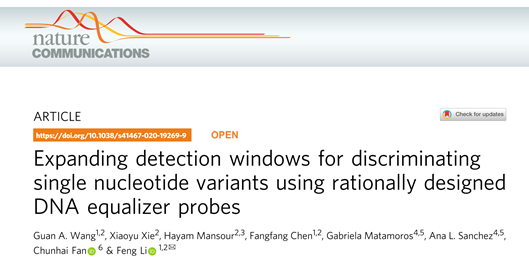Prof. Feng Li's team from the College of Chemistry has recently published a paper entitled "Expanding Detection Windows for Discriminating Single Nucleotide Variants Using Rationally Designed DNA Equalizer Probes" in Nature Communications. Sichuan University is the first work unit of this paper. The first author is Guan A. Wang, a doctoral student in a joint program between Sichuan University and Brock University, Canada. Prof. Feng Li is the sole corresponding author.

“Combining experimental and simulation strategies to facilitate the design and operation of nucleic acid hybridization probes are highly important to both fundamental DNA nanotechnology and diverse biological/biomedical applications. Herein, we introduce a DNA equalizer gate (DEG) approach, a class of simulation-guided nucleic acid hybridization probes that drastically expand detection windows for discriminating single nucleotide variants in double-stranded DNA (dsDNA) via the user-definable transformation of the quantitative relationship between the detection signal and target concentrations. --- As DEG acts directly on dsDNA, it is readily adaptable to nucleic acid amplification techniques, such as polymerase chain reaction (PCR). The practical usefulness of DEG was demonstrated through the simultaneous detection of infections and the screening of drug-resistance in clinical parasitic worm samples collected from rural areas of Honduras.” (Abstract)
Feng Li's research team has carried out a large number of basic and applied research on DNA nanotechnology, DNA molecular machine, and in vitro diagnosis technology of diseases. Their early results were published in . Am. Chem. SOC.,Angew. Chem. Int. Ed.,Chem. SCI., ACS Nano,CCS Chemistry, among other important journals at home and abroad.
Article link:https://www.nature.com/articles/s41467-020-19269-9
